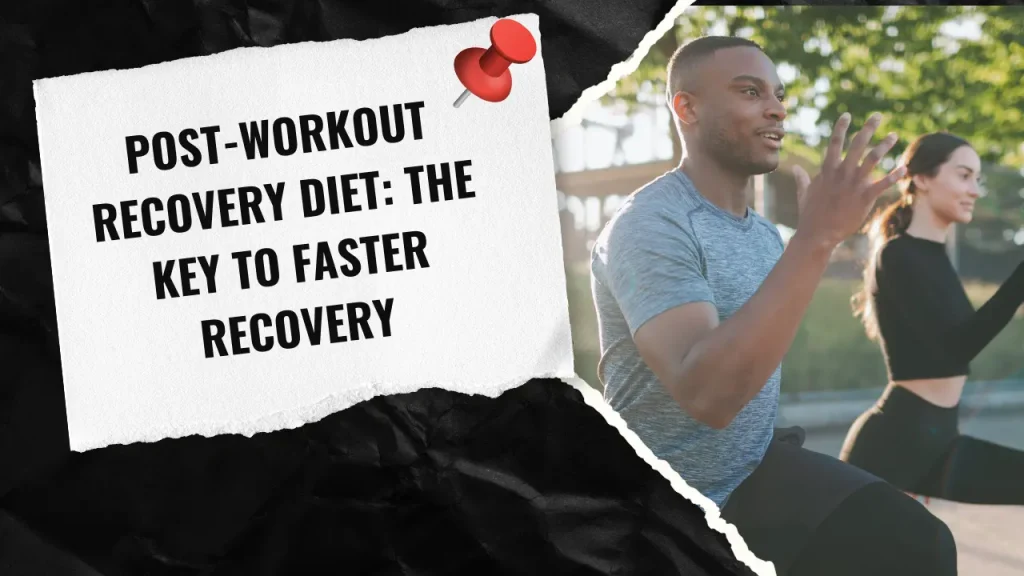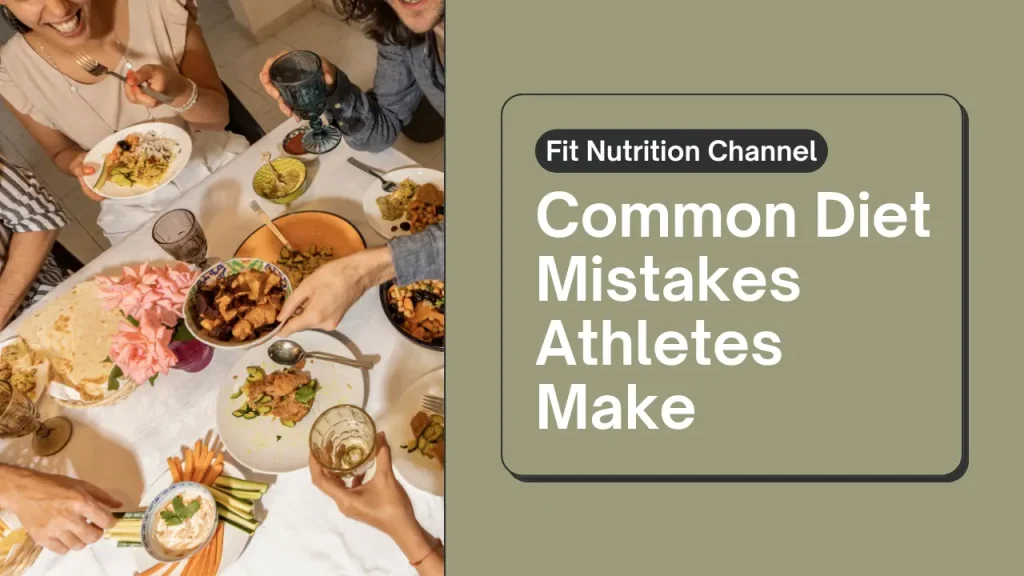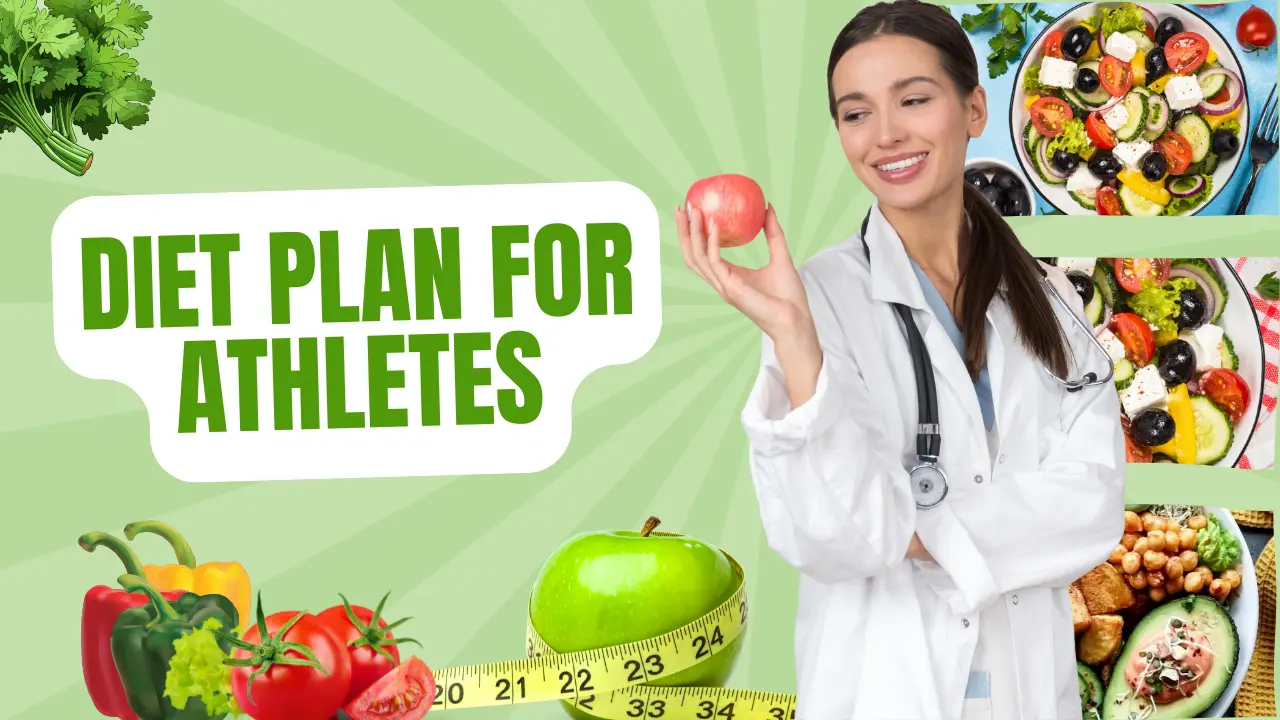Fueling your body the right way can make or break your performance. Whether you’re sprinting toward the finish line or powering through a tough training session, having a solid diet plan for athletes isn’t just about eating clean—it’s about eating smart. As an athlete, I’ve learned the hard way that skipping a well-balanced meal can lead to sluggish workouts and slow recovery. The good news? With the right sports nutrition plan, you can boost endurance, build strength, and recover faster. In this guide, I’ll walk you through the essentials—what to eat, when to eat, and how to structure your athlete meal plan for peak performance. Let’s dive in and fuel up the right way!

Understanding an Athlete’s Nutritional Needs
Think of your body like a high-performance car. You wouldn’t fuel a race car with low-quality gas and expect it to win, right? The same goes for athletes—nutrition isn’t just about eating; it’s about fueling for success. A balanced diet for sports performance ensures you have the right mix of macronutrients—carbs for energy, protein for muscle repair, and healthy fats for endurance.
Carbs are your body’s premium fuel, powering intense workouts and competition days. Proteins act as the repair crew, rebuilding muscle fibers after tough training sessions. And healthy fats? They keep you going during long endurance workouts. But it doesn’t stop there—vitamins, minerals, and hydration play a crucial role too. Whether you’re a sprinter or a marathoner, fine-tuning your sports nutrition plan will help you perform at your peak.
Building the Perfect Athlete Meal Plan
Planning your meals isn’t about following a strict, boring diet. It’s about giving your body what it needs at the right time. A well-structured athlete meal plan balances proteins, carbs, and fats to maximize performance and recovery.
Start your day with complex carbs like oats or whole grain toast for long-lasting energy. Pair it with lean protein—eggs, Greek yogurt, or tofu—to kickstart muscle repair. Lunch and dinner should include lean meats, fish, or plant-based protein, paired with fiber-rich veggies and healthy fats like avocado or nuts. And let’s not forget hydration—water and electrolytes keep your body running smoothly.
Meal timing is key too. Eating too little before training? You’ll feel sluggish. Eating too much? You’ll feel weighed down. Finding that sweet spot ensures your body gets the fuel it needs exactly when it needs it.
High-Protein Diet for Athletes: How Much is Enough?
We’ve all heard that high-protein diets for athletes are essential, but how much do you really need? More isn’t always better. Your muscles need protein to recover and grow, but your body can only process so much at a time.
A good rule of thumb is 1.2 to 2.0 grams of protein per kilogram of body weight—depending on your training intensity. Chicken, fish, eggs, dairy, and plant-based options like beans and tofu are all great sources. But don’t fall into the “all protein, no carbs” trap. Carbs help shuttle protein to muscles for repair, making them just as important.
The key? Spread your protein intake throughout the day. Instead of loading up on one massive serving, aim for balanced meals and snacks. A post-workout smoothie with protein powder, banana, and almond milk? Perfect recovery fuel.
Carb-Loading for Athletes: When and Why?
Carbs have gotten a bad reputation, but if you’re an athlete, they’re your best friend. Carb-loading for athletes is a proven strategy to maximize glycogen stores before endurance events like marathons or long-distance cycling. Think of it as filling up your fuel tank before a long road trip.
But it’s not about stuffing yourself with pasta the night before a race. True carb-loading happens over a few days. Gradually increasing your carb intake while tapering workouts helps store energy efficiently. Whole grains, sweet potatoes, fruits, and quinoa are excellent sources.
Not every athlete needs to carb-load, though. If you’re training for shorter bursts of activity—like sprinting or weightlifting—a balanced intake of carbs throughout the day is enough to keep you performing at your best.
Pre-Workout Meal Plan: What to Eat Before Training
Ever hit the gym or track feeling sluggish? That’s what happens when you don’t fuel properly. A well-planned pre-workout meal plan helps you train harder and recover faster.
Timing is crucial. Eating a balanced meal 2-3 hours before a workout gives your body time to digest and absorb nutrients. If you’re short on time, a light snack 30-60 minutes before can still provide a boost.
So, what should you eat? A mix of carbs and protein is ideal. Oatmeal with fruit, a banana with peanut butter, or a smoothie with Greek yogurt and berries all work well. Avoid heavy, greasy foods—they can slow digestion and leave you feeling sluggish.
Finding what works best for your body takes trial and error, but once you nail your pre-workout meal plan, you’ll feel the difference in your performance.
Post-Workout Recovery Diet: The Key to Faster Recovery
You just crushed a tough workout—your muscles are screaming, sweat is dripping, and you feel like a warrior. But what you eat right after training can make or break your recovery. Your body is like a sponge after exercise, ready to absorb nutrients to rebuild and refuel.
The golden rule? Replenish within 30-60 minutes. This is the magic window when your muscles crave nutrients the most. A well-balanced post-workout recovery diet should include protein to repair muscle fibers and carbs to restore glycogen levels. A little healthy fat won’t hurt either—it helps keep you full and supports joint health.
Go for something easy to digest, like a protein shake with a banana, Greek yogurt with honey, or grilled chicken with quinoa and roasted veggies. And don’t forget hydration! Your muscles need water and electrolytes to recover efficiently. If you skip post-workout nutrition, expect longer recovery times, fatigue, and a higher risk of injury. Fuel up smart, and your body will thank you.

Nutrition for Endurance Athletes: Staying Energized
Endurance sports are a whole different beast. If you’re training for a marathon, triathlon, or long-distance cycling, your nutrition game needs to be on point. You’re burning through energy reserves faster than a car on a road trip—so what you eat before, during, and after training matters big time.
Carbs are your best fuel source for endurance. Unlike quick sprint workouts, endurance athletes rely on a steady flow of glycogen. Whole grains, fruits, sweet potatoes, and oats should be staples in your diet. During long training sessions, sports drinks, energy gels, or even a banana can help maintain energy levels.
Hydration is another non-negotiable. Dehydration can zap your performance, cause cramps, and make you hit the dreaded wall. Drink water consistently, and for long workouts, add electrolytes to keep your body in balance.
After training, a protein-carb combo meal will kickstart recovery. Think scrambled eggs with whole-grain toast, a smoothie with almond butter, or salmon with quinoa and greens. The right endurance athlete nutrition plan ensures you stay strong, avoid burnout, and recover like a champ.
Best Foods for Athletes: What to Include in Your Diet
Want to know the secret weapon of top-performing athletes? It’s not fancy supplements or extreme diets—it’s real, nutrient-dense foods.
Here are some of the best foods for athletes that should be in your kitchen:
- Oats & whole grains – Slow-releasing carbs for sustained energy.
- Lean proteins (chicken, fish, eggs, tofu, Greek yogurt) – Essential for muscle repair and growth.
- Bananas & berries – Loaded with antioxidants and quick-digesting energy.
- Leafy greens & colorful veggies – Provide essential vitamins and minerals.
- Nuts & seeds – Packed with healthy fats, protein, and magnesium (great for muscle recovery).
- Salmon & avocados – Rich in omega-3s, which help with inflammation and recovery.
- Sweet potatoes & quinoa – Great sources of complex carbs and fiber.
And what should you avoid? Processed junk, excessive sugar, and greasy fast food. These can slow you down, mess with digestion, and lead to energy crashes. Stick to whole, real foods, and your body will run like a well-oiled machine.

Common Mistakes in an Athlete’s Diet and How to Avoid Them
Even the best athletes make nutrition mistakes—but you don’t have to. Here are some of the most common ones and how to fix them:
- Skipping meals or under-fueling – Training on an empty stomach? Bad idea. Not eating enough can lead to low energy, muscle loss, and slow recovery. Make sure you eat enough to fuel your training.
- Overloading on protein – A high-protein diet for athletes is important, but don’t neglect carbs. Carbs fuel workouts, and without them, your performance will suffer.
- Ignoring hydration – Dehydration can cause fatigue, cramps, and sluggish performance. Keep a water bottle with you at all times, and replenish electrolytes after intense workouts.
- Relying too much on supplements – Protein shakes and bars are convenient, but they shouldn’t replace whole foods. Get your nutrients from real food first, and supplement only when needed.
- Not timing meals properly – Eating too close to a workout? You might feel sluggish. Eating too far from training? You might lack energy. Find what works best for your body and stick to it.
Conclusion: Creating Your Own Sports Nutrition Plan
At the end of the day, there’s no one-size-fits-all approach to a diet plan for athletes. Every athlete is different, and the key is listening to your body. What works for one person might not work for another, so experiment and find what fuels you best.
To build the perfect sports nutrition plan, remember these golden rules:
- Eat balanced meals with the right mix of carbs, protein, and fats.
- Stay hydrated—water and electrolytes are just as important as food.
- Time your meals wisely to maximize energy and recovery.
- Choose whole, nutrient-dense foods over processed junk.
- Adjust your diet based on training intensity—fuel up more on heavy training days, and focus on recovery on rest days.
Most importantly, enjoy the process. Eating for performance doesn’t have to be complicated or boring. Make it a lifestyle, not a chore. Keep experimenting, stay consistent, and watch your performance soar. Fuel up, train hard, and dominate your game!
FAQs: The Ultimate Diet Plan for Athletes
1. What is the best diet plan for athletes?
A diet plan for athletes should include balanced macronutrients—carbs for energy, protein for muscle repair, and healthy fats for endurance. Hydration is also crucial.
2. How does a sports nutrition plan improve performance?
A well-structured sports nutrition plan enhances endurance, speeds up recovery, and prevents fatigue by providing the right nutrients at the right time.
3. What should an athlete meal plan include?
An athlete meal plan should have lean proteins, whole grains, healthy fats, and vegetables. Meal timing is key to sustaining energy and recovery.
4. How much protein does an athlete need daily?
A high-protein diet for athletes requires 1.2–2.0g of protein per kg of body weight to support muscle growth and recovery.
5. What is carb-loading for athletes, and when should you do it?
Carb-loading for athletes increases glycogen stores before endurance events. Start 2-3 days before competition using whole grains, fruits, and starchy vegetables.
6. What should I eat before a workout?
A pre-workout meal plan should include carbs for quick energy and protein for muscle support, such as oatmeal with banana or Greek yogurt with fruit.
7. What is the best post-workout recovery diet?
A post-workout recovery diet should include protein, carbs, and hydration—like a protein smoothie or chicken with sweet potatoes—to repair muscles and restore energy.
8. What are the best foods for athletes?
The best foods for athletes include lean meats, fish, eggs, nuts, whole grains, leafy greens, and hydration sources like coconut water.
9. What foods should athletes avoid?
Avoid processed foods, sugary drinks, fried foods, and excessive caffeine, as they can lead to sluggish performance and poor recovery.
10. How can endurance athletes maintain energy levels?
Endurance athlete nutrition should focus on carb-rich meals, hydration, and electrolytes to sustain energy for long workouts.
11. What are common mistakes in an athlete’s diet?
Skipping meals, relying on supplements, under-fueling, and ignoring hydration can hurt performance. A balanced diet for sports performance is essential.
12. How can I create a personalized sports nutrition plan?
A sports nutrition plan should be based on your training needs, body type, and performance goals. Consult a nutritionist for the best results.

